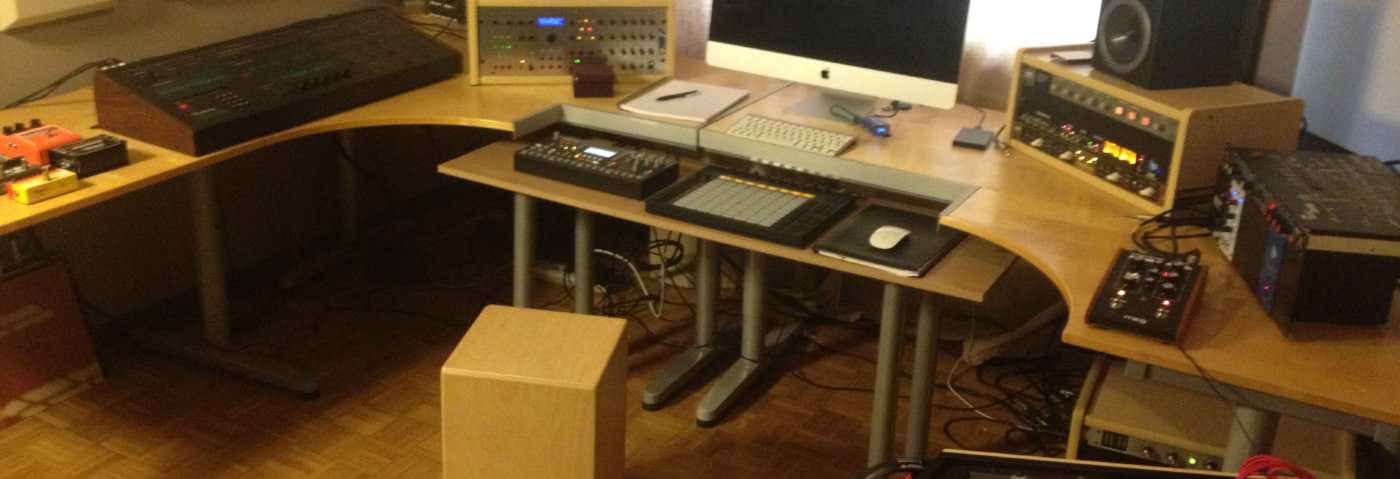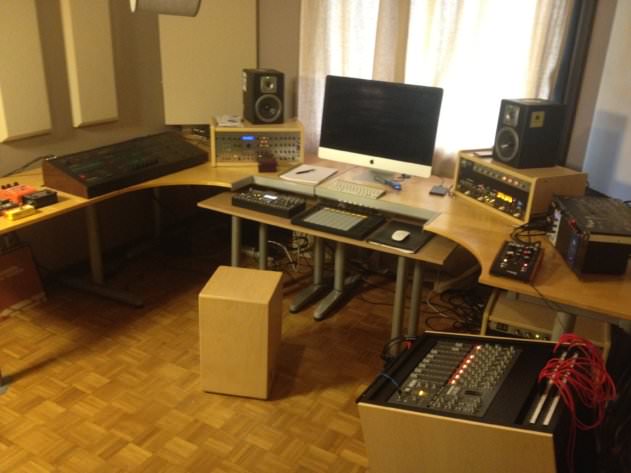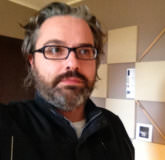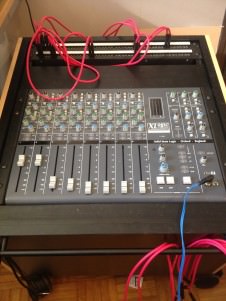The Vulture Music boss talks about production techniques, addresses some of the myths of 90s French house and lets us in on the details of his latest project: a collaborative album with DJ Falcon.
Describing Alan Braxe as one of the unsung heroes of French house might seem like an exaggeration, but it’s probably true. As a member of Stardust he was responsible for one of the biggest and best dance crossovers of all time in the form of ‘Music Sounds Better With You’, but despite such incredible success so early in his career he chose not to chase stardom.
Braxe – real name Alain Quême – admits that he’s never felt comfortable in the spotlight. While many of his friends and colleagues from the mid-90s Paris club scene have gone on to become household names, Braxe shunned celebrity in favour of launching his own Vulture Music label and building up a back catalogue of underground classics such as ‘Intro’ with long-term collaborator Fred Falke and ‘Lumberjack’ with Kris Menace.
Now based in the south of France, Alain tells us that he drops his two children off at school each morning and returns to his home studio to work on music until it’s time to go back and collect them. It’s a regimented routine which sums up his clear and focussed approach to production. Having made music for nearly 20 years, he has a clear idea of his favoured method: a tidy studio, a few essential pieces of equipment and the patience to work until inspiration strikes. Or, as he poetically describes it, “waiting for luck to happen”.
Attack: Looking around your studio, you’ve got lots of hardware but everything seems to be based around Ableton, is that right?
Alan Braxe: I’ve been using Ableton for five years and I’d love to move to Pro Tools but I’m working on an important project and I’m a bit scared because of the learning curve of Pro Tools, so I keep on working on Ableton. It’s amazing software but right now it’s a bit more like I consider it as a plugin itself. What I need now is to use something like Pro Tools as a recorder where I can edit audio perfectly.
What’s the project you’re working on?
I’m trying to work on an album with my cousin, DJ Falcon. It’s quite an ambitious project. We’re in the process of writing right now.
That sounds interesting – we’ll come back to it in a bit. Going back to Ableton, it seems like it might have been a natural step for you, coming from making music with the E-mu SP-1200? Was it easy to make the transition in terms of the way Ableton works with samples?
I worked on Digital Performer on the Mac for two years and then when I discovered Ableton I was really excited by the clip scenarios and the whole structure of it, being able to do whatever you want with audio. There are so many really exciting things with Ableton which are really different from working with the SP-1200, but in a way it’s the same feeling. When I started with the SP-1200 what I liked was that it was very simple and you could cut and reorganise samples very easily. It’s two different worlds but that’s the link between them.
What’s good now with Ableton, especially with Max for Live, is that you can really have control of the audio. I’m really excited by the idea of treating an audio signal as you would a VCO in a synthesiser. I just discovered the Granulator instrument two weeks ago and it’s amazing. The problem now is I’m a bit done with Ableton for building songs and building structures, but the creative possibilities are really exciting.
You mentioned that you’re writing with DJ Falcon. Is writing a separate process for you or do you write, mix and produce all in one go?
There’s no specific rule but what I’ve learned over the years is that when you’re working sometimes you’re behind your gear and suddenly something good starts coming. When you know it’s good the most important thing is to record the idea as quickly as possible. If the music’s coming from hardware what’s important is to stop listening to what you’re doing and record it really cleanly and really perfectly, because you’ll probably never find it again.
The writing process is a mixture of capturing stuff which arrives by accident and a more formal way of writing; a mix of formality and luck. It’s about having a studio which allows you to have access to luck. That’s very important in music, I think. Once luck happens it just turns to a more formal process.
Which tracks in your back catalogue were down to luck?
All of them! This is what I’m scared about because sometimes you’re working for hours, days, weeks and nothing’s happening then suddenly there’s a kind of magic happening and you don’t know why, you’re not in control of it. Some people are really strong because they can control the luck factor but I can’t so I’m just waiting for luck to fall on me. Most of the tracks I’ve released, I decided to release them because I felt luck happened. Even if they weren’t perfect or there were a lot of problems in the production, I felt there was something interesting in it.
Sometimes you’re working for hours, days, weeks and nothing’s happening then suddenly there’s a kind of magic happening and you don’t know why.
A lot of your music in the past has had roughness to it. There are all kinds of myths about you and other French producers using cheap gear like the Alesis 3630 to get that classic sound back in the 90s. How much of that was true? Were you using the cheap gear because you liked the dirty sound or just because it was all you could get hold of at the time?
Yeah, the Alesis 3630… I’ve been working with this compressor for ten years. When I started making music Thomas Bangalter from Daft Punk told me, ‘OK, the 3630 is a good tool, you should buy it’. It’s cheap and it does a specific job amazingly well, which is to over-compress and create the pumping sidechain sound. It’s a good tool – I’ve been working with it for years. At the beginning the 3630 was kind of crucial to obtain the sound I was looking for, but I can’t work with it any more. I’m done with it. I worked too much with it. I hate it! I’m discovering other compressors and working with compression in a much more subtle way, like over-compressing room mics for drum overheads or just compressing the master a little. I was happy with the 3630 but it’s a learning process and now I can achieve similar results with other compressors.
At that time, instruments like the Ensoniq ASR-10, the Roland S-760 sampler, the 3630 and the SP-12 were kind of crucial in the process. Also we worked with the small eight-channel Mackie mixer a lot and that was part of the sound.




04.33 PM
Legend!
04.50 PM
How does he sit on that little block of wood?1? I’d last ten minutes…
08.32 PM
@Fraser haha my real chair is too big and looks like an ecouragement to laziness.
For the Picture, the monastic approach of the cube looked better 😉
02.53 AM
Did you sell your SP1200, ASR, and S760?
07.23 AM
@Braxe: Nice to see you here. Interested to read your approach to creativity – that a lot of it’s accident! Thanks for the honesty and the music of course.
11.25 AM
@KV SP, ASR and 760 still in use time to time .
04.02 PM
@Brake, super matos par contre, tu as acheté quoi à Decathlon ? Leur chaussettes sont vraiment pas chères (http://www.attackmagazine.com/features/interview/alan-braxe/attachment/img_1404/) lol
09.49 PM
@braxe – Love the setup! The flow and way the equipment is organised is great!
Where did you purchase the desk/furniture?
02.01 PM
@Izzy, maindesk is Ikea + 4 rackunit :Omnirax + ssl X desk is racked on a sterling modular rackbay. Sterling Modular is great, plenty of productd and options but it’s quite expensive.
05.56 PM
This is going to be really interesting as you’ve both got such unique styles. And vocals!!! Dammit I’m looking forward to this! 😀 Any ideas on the Band name?
10.36 PM
@Braxe. Thanks! Absolutely love your set up! You are without a doubt one of my biggest influences and favourite producers!! Love everything you’ve done! 🙂
07.42 PM
Xpander…. yum.
09.01 PM
What a great and inspirational interview.Such an honest and down to earth bloke.Kudos to you Monsieur Braxe.
07.37 PM
i am glad you still use your SP Alan. I loved the future music video where you explained it. Such a wonderful old machine 🙂
12.24 AM
@Braxe Nice setup! How do you like the Germanium? Do you record Synths with it?
04.42 PM
old Studio was epic cult!!! 3630 Sp1200 S760 awsome… now its just the 0815 Dance Equipment crap ableton machinedrum ssl masterbus lunchbox… this is rly meta !!!! cant belive he can mix right on These tiny Monitors 😀 his Sound changed a lot but hes still a legend!
01.39 PM
alan are you really mixing all your tracks only on those low end monitors we can see ?
09.18 PM
@braxe. C´est quoi le patchbay que tu utilises? Merci d´avance pour l´info 🙂